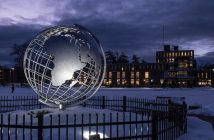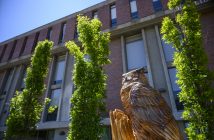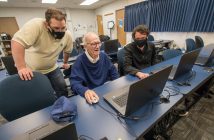Professor shows students how to make a difference
Tim Parshall, Ph.D., professor of Biology and Environmental Science, is teaching students how to make a mark on history.
Dr. Parshall spent his sabbatical in spring 2012 in Monteverde, Costa Rica, working on tropical forest restoration in collaboration with colleague Debra Hamilton of the Costa Rican Conservation Association.
As a forest ecologist, Dr. Parshall visited four sites where Hamilton planted thousands of trees over the past 10 years. A plan was developed to assess the plantings’ success by having University students tag and measure over 1,500 tree seedlings.
“We are in the process of evaluating the data to determine the survival and growth rates of these seedlings, which is new information to science,” Dr. Parshall says.
According to Dr. Parshall, over the past 50 years, the size of the human population has been growing rapidly, thus impacting ecosystems in substantial ways. Over the next several decades, he says, society will be faced with important decisions about major environmental issues such as climate change, loss of biodiversity and food production.
“I’d like to be able to inspire my students to make a contribution at this particularly important time in our human history,” Dr. Parshall says. “If I could do one thing in my position at Westfield State, this is what I’d like it to be.”
How it began
Dr. Parshall is a native of Wheeling, W.Va. “My backyard blended in with miles of unbroken forest, where I spent a lot of my childhood hiking and exploring.”
Studying biology at Purdue University, Dr. Parshall enjoyed his first taste of professorhood as an undergraduate teaching assistant in biology. He then taught biology and ecology courses in graduate school at the University of Minnesota. “By that time, I was hooked [on teaching],” he says.
Dr. Parshall’s research focused on studying entire forest ecosystems and how they change over long periods of time in response to the climate and human impact. After graduate school, he took a postdoctoral research position at the Harvard Forest, where he studied forest ecology, focusing on how forests in New England have changed.
Dr. Parshall missed teaching and eventually found his current position at Westfield State in 2004, and he says, “I’m still here, and I love what I’m doing.”
Research in the rainforest
Traveling often to Mexico and Belize gave Dr. Parshall the idea to teach an environmental science course outside of the classroom. Way outside.
In 2009, he traveled with 18 students to Belize. “It was an amazing trip that had a major impact on the lives of the students, and my life, too,” he says.
A year later, Dr. Parshall joined the Education Department for a course led in Costa Rica. “I met the people there, and I was so impressed that I developed a new course for Costa Rica,” he says.
The Costa Rican course ran again in January. According to Dr. Parshall, Costa Rica is amazing, because you can drive 30 minutes and be in a new ecosystem. “Large blocks of forests still remain, and there is so much to show students.”
“Costa Rica is a very easy place to travel to as a tourist,” Dr. Parshall adds. “It is the best example of how ‘ecotourism’ can influence conservation, the economy and jobs.”
Not only is Dr. Parshall bringing his lectures to life by bringing students to a location for hands-on learning, he’s helping to make significant reforestation efforts. “For me, this is a once-in-a-lifetime research opportunity. I can put my background as a forest ecologist to good use and work on a project that makes a clear impact on habitats and natural ecosystems,” he says.




